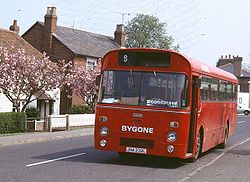
Bygone buses
Encyclopedia

Bus deregulation
Bus deregulation in Great Britain came into force on 26 October 1986, as part of the Transport Act 1985.The 'Buses' White Paper was the basis of the Transport Act 1985, which provided for the deregulation of local bus services in the whole of the United Kingdom except for Northern Ireland and...
bus
Bus
A bus is a road vehicle designed to carry passengers. Buses can have a capacity as high as 300 passengers. The most common type of bus is the single-decker bus, with larger loads carried by double-decker buses and articulated buses, and smaller loads carried by midibuses and minibuses; coaches are...
operator based in Biddenden
Biddenden
Biddenden is a village and civil parish in the Ashford District of Kent, England. The village lies on the Weald of Kent, some five miles north of Tenterden. It was centre for Wealden iron industry and also of clothmaking. During the reign of Edward III some Flemish clothworkers settled in the area...
, Kent
Kent
Kent is a county in southeast England, and is one of the home counties. It borders East Sussex, Surrey and Greater London and has a defined boundary with Essex in the middle of the Thames Estuary. The ceremonial county boundaries of Kent include the shire county of Kent and the unitary borough of...
, England
England
England is a country that is part of the United Kingdom. It shares land borders with Scotland to the north and Wales to the west; the Irish Sea is to the north west, the Celtic Sea to the south west, with the North Sea to the east and the English Channel to the south separating it from continental...
. It operated on local competitive and tendered services in Maidstone
Maidstone
Maidstone is the county town of Kent, England, south-east of London. The River Medway runs through the centre of the town linking Maidstone to Rochester and the Thames Estuary. Historically, the river was a source and route for much of the town's trade. Maidstone was the centre of the agricultural...
, Medway
Medway
Medway is a conurbation and unitary authority in South East England. The Unitary Authority was formed in 1998 when the City of Rochester-upon-Medway amalgamated with Gillingham Borough Council and part of Kent County Council to form Medway Council, a unitary authority independent of Kent County...
and The Weald of Kent
Weald
The Weald is the name given to an area in South East England situated between the parallel chalk escarpments of the North and the South Downs. It should be regarded as three separate parts: the sandstone "High Weald" in the centre; the clay "Low Weald" periphery; and the Greensand Ridge which...
. It emerged from a company called River Valley Coaches, and used an allover red livery.
Bygone used some vintage types of buses, as well as many second hand standard buses of the era. Bygone was notable as one of the few public transport operators of the Routemaster
Routemaster
The AEC Routemaster is a model of double-decker bus that was built by Associated Equipment Company in 1954 and produced until 1968. Primarily front-engined, rear open-platform buses, a small number of variants were produced with doors and/or front entrances...
bus in Kent, and also for a time operated one of the 5 prototype Leyland Titan
Leyland Titan (B15)
The Leyland Titan was a model of double-decker bus produced by the Leyland Truck & Bus division of British Leyland from 1977 until 1984, almost exclusively for London Transport.-Development:...
s, NHG 732P (B15.04). Bygone operated a mixed fleet of vehicles, with many one-off types, but did own several Bristol
Bristol Commercial Vehicles
Bristol Commercial Vehicles was a vehicle manufacturer of in Bristol, England. Most production was of buses but trucks and railbus chassis were also built....
LHs and Leyland National
Leyland National
The Leyland National is a British single-deck bus built in large quantities between 1972 and 1985. It was developed as a joint project between two UK nationalised industries - the National Bus Company and British Leyland. Buses were constructed at a specially built factory at the Lillyhall...
s, as well as some coaches also used on bus routes. Many vehicles appeared in non-red livery after being pressed into service straight after purchase. Bygone vehicles were known for their often customised paintwork.
Bygone provided competition against newly privatised dominant operator, Maidstone & District, with practises by both companies becoming part of the scope of a 1993 Competition Commission
Competition Commission
The Competition Commission is a non-departmental public body responsible for investigating mergers, markets and other enquiries related to regulated industries under competition law in the United Kingdom...
inquiry into The supply of bus services in Mid and West Kent. Despite the report being critical of M&D, Bygone was sold to M&D shortly after.

